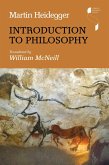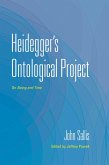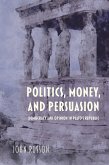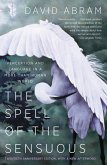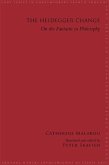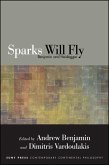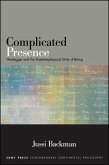Hölderlin's Hymn "Remembrance" (eBook, ePUB)
Übersetzer: Mcneill, William; Ireland, Julia


Alle Infos zum eBook verschenken

Hölderlin's Hymn "Remembrance" (eBook, ePUB)
Übersetzer: Mcneill, William; Ireland, Julia
- Format: ePub
- Merkliste
- Auf die Merkliste
- Bewerten Bewerten
- Teilen
- Produkt teilen
- Produkterinnerung
- Produkterinnerung

Hier können Sie sich einloggen

Bitte loggen Sie sich zunächst in Ihr Kundenkonto ein oder registrieren Sie sich bei bücher.de, um das eBook-Abo tolino select nutzen zu können.
"This faithful and readable translation... serves as a critical orientation to interpreting Heidegger's later thought" inspired by Hölderlin's poetry (Christopher D. Merwin, Emory University). Over the course of 1941-42, Martin Heidegger delivered a lecture course on Friedrich Hölderlin's hymn, "Remembrance." Immediately following his confrontation with Nietzsche, it lays out a detailed plan for the interpretation of Hölderlin's poetry in which remembrance is a central concern. With its emphasis on the "free use of the national" and the "holy of the fatherland," the course marks an important…mehr
- Geräte: eReader
- ohne Kopierschutz
- eBook Hilfe
- Größe: 0.73MB
![Introduction to Philosophy (eBook, ePUB) Introduction to Philosophy (eBook, ePUB)]() Martin HeideggerIntroduction to Philosophy (eBook, ePUB)50,95 €
Martin HeideggerIntroduction to Philosophy (eBook, ePUB)50,95 €![Heidegger's Ontological Project (eBook, ePUB) Heidegger's Ontological Project (eBook, ePUB)]() John SallisHeidegger's Ontological Project (eBook, ePUB)33,95 €
John SallisHeidegger's Ontological Project (eBook, ePUB)33,95 €![Politics, Money, and Persuasion (eBook, ePUB) Politics, Money, and Persuasion (eBook, ePUB)]() John RussonPolitics, Money, and Persuasion (eBook, ePUB)29,95 €
John RussonPolitics, Money, and Persuasion (eBook, ePUB)29,95 €![The Spell of the Sensuous (eBook, ePUB) The Spell of the Sensuous (eBook, ePUB)]() David AbramThe Spell of the Sensuous (eBook, ePUB)4,99 €
David AbramThe Spell of the Sensuous (eBook, ePUB)4,99 €![The Heidegger Change (eBook, ePUB) The Heidegger Change (eBook, ePUB)]() Catherine MalabouThe Heidegger Change (eBook, ePUB)31,95 €
Catherine MalabouThe Heidegger Change (eBook, ePUB)31,95 €![Sparks Will Fly (eBook, ePUB) Sparks Will Fly (eBook, ePUB)]() Sparks Will Fly (eBook, ePUB)31,95 €
Sparks Will Fly (eBook, ePUB)31,95 €![Complicated Presence (eBook, ePUB) Complicated Presence (eBook, ePUB)]() Jussi BackmanComplicated Presence (eBook, ePUB)31,95 €
Jussi BackmanComplicated Presence (eBook, ePUB)31,95 €-
-
-
Dieser Download kann aus rechtlichen Gründen nur mit Rechnungsadresse in A, B, BG, CY, CZ, D, DK, EW, E, FIN, F, GR, HR, H, IRL, I, LT, L, LR, M, NL, PL, P, R, S, SLO, SK ausgeliefert werden.
- Produktdetails
- Verlag: Indiana University Press
- Seitenzahl: 204
- Erscheinungstermin: 22. Dezember 2021
- Englisch
- ISBN-13: 9780253035882
- Artikelnr.: 63267048
- Verlag: Indiana University Press
- Seitenzahl: 204
- Erscheinungstermin: 22. Dezember 2021
- Englisch
- ISBN-13: 9780253035882
- Artikelnr.: 63267048
- Herstellerkennzeichnung Die Herstellerinformationen sind derzeit nicht verfügbar.
PRELIMINARY CONSIDERATIONS
Preparation for Hearing the Word of the Poetizing
1. What the Lecture Course Does Not Intend. On Literary-Historiographical
Research and the Arbitrary Interpretation of Poetry
2. The Attempt to Think the Word Poetized by Hölderlin
3. That Which is Poetized in the Word of Essential Poetizing 'Poetizes Over
and Beyond' the Poet and Those Who Hear this Word
4. The Essential Singularity of Hölderlin's Poetizing is Not Subject to Any
Demand for Proof
5. The Poetizing Word and Language as Means of Communication. Planetary
Alienation in Relation to the Word
Review
1) 'Thinking' That Which is Poetized
2) Hearing That Which is Poetized is Hearkening: Waiting for the Coming of
the Inceptual Word
6. The Univocity of 'Logic' and the Wealth of the Genuine Word Out of the
Inexhaustibility of the Commencement
7. Remark on the Editions of Hölderlin's Works
MAIN PART
"Remembrance"
8. A Word of Warning about Merely Admiring the Beauty of the Poem
9. Establishing a Preliminary Understanding About 'Content' and What is
Poetized in the Poem
Review
1) The Wealth of the Poetizing Word
2) Poetizing and Thinking as Historical Action
3) The Transformation of the Biographical in That Which is Poetized
10. That Which is Poetized in the Poetizing and the 'Content' of the Poem
are Not the Same
Part One
Entry into the Realm of the Poem as Word
11. The Beginning and Conclusion of the Poem
12. Concerning Language: The Poetizing Word and Sounding Words
13. Language in Our Historical Moment
14. Preliminary Consideration of the Unity of the Poem
Review
15. Poetizing and the Explanation of Nature in Modernity. On the Theory of
'Image' and 'Metaphor'
16. "The Northeasterly blows." The Favor of Belonging to the Vocation of
Poet
17. The "Greeting." On the Dangerous Addiction to
Psychological-Biographical Explanation
18. Norbert von Hellingrath on "Hölderlin's Madness." Commemoration of von
Hellingrath
19. Hölderlin's De-rangement as Entering the Range of a Different Essential
Locale
20. The "Going" of the Northeasterly. The "Greeting" of the Poet's Going
with It
Review
21. Transition From the First to the Second Strophe. The Greeting
Thinking-in-the-Direction-Of as the Letting Be of the Greeted. The Greeted
Thinks Its Way To the Poet
22. In the Unity of That Which is Greeted, Gathered by the Poet's Greeting,
the Day's Work and Stead of Human Dwelling Arise
Part Two
"Holidays" and "Festival" in Hölderlin's Poetizing
23. Preliminary Hints From Citing 'Passages' In the Poetry
Review
24. Celebrating as Pausing From Work and Passing Over into Reflection upon
the Essential
25. The Radiance of the Essential Within Celebration. Play and Dance
26. The Essential Relation Between Festival and History. The "Bridal
Festival" of Humans and Gods
27. The Festive as Origin of Attunements. Joy and Mournfulness: The Epigram
"Sophocles"
Review
1) Celebration as Becoming Free in Belonging to the Inhabitual
2) Improbable Celebration in the Echo of What is 'Habitual' in a Day: The
First Strophe of the Elegy "Bread and Wine"
3) "The Festival" and the Appropriative Event. The Festival of the Day of
History in Greece. Hölderlin and Nietzsche
28. The Greeting of the Women. Their Role in Preparing the Festival. The
Women of Southern France and the Festival that Once Was in Greece
Review
29. Transition as Reconciliation and Equalization
30. "Night": Time-Space of a Thinking Remembering the Gods that Once Were
Transition in Receiving the Downgoing and Preparing the Dawn
31. Gods and Humans as Fitting Themselves to What is Fitting. That Which is
Fitting and Fate
32. How Fate is Viewed Within the Calculative Thinking of Metaphysics, and
"Fate" in Hölderlin's Sense
33. The Festival as Equalizing the While for Fate
34. The Transition from What Once Was in Greece into That Which is to Come:
The Veiled Truth of the Hymnal Poetizing
Review
1) The Provenance of the Poetized Transition. The "Demigods" Called into
the Transition. Hegel and Hölderlin
2) What is Fitting for Humans and Gods is the Holy. The Fitting of the
Jointure as Letting-be
3) Fitting as Releasing into the Search for Essence and the Loss of
Essence. Errancy and Evil
4) The Temporal Character of the "While," and the Metaphysical Concept of
Time
35. "Lulling Breezes": Sheltering in the Origin, the Ownmost of Humans and
Gods. "Golden Dreams"
36. Interim Remark Concerning Scientific Explanations of Dreams
37. The Dream. That Which Is Dreamlike as the Unreal or Nonexistent
38. Greek Thought on the Dream. Pindar
Review
39. The Dream as Shadow-like Appearing of Vanishing into the Lightless.
Presencing and Absencing
40. The Possible as Presencing of Vanishing from, and as Appearing of
Arrival Within 'Reality' (Beyng)
41. Hölderlin's Treatise "Becoming in Dissolution." Dream as Bringing the
Possible and Preserving the Transfigured Actual
Part Three
The Search for the Free Use of One's Own
42. Hesitant Awe Before the Transition onto "Slow Footbridges"
Review
43. Greece and Germania: The Banks and Sides of the Transition Toward
Learning What is Historically One's Own
44. One's Own as the Holy of the Fatherland, Inaccessible to Theologies and
Historiographical Sciences. The "Highest"
45. The Transition From the Second to the Third Strophe. Grounding in the
Homely
46. Interim Remark Concerning Three Misinterpretations of Hölderlin's Turn
to the "Fatherland"
47. Learning the Appropriation of One's Own
48. What is Their Own for the Germans: "The Clarity of Presentation"
49. The Drunkenness of Higher Reflection and Soberness of Presentation in
the Word
50. "Dark Light": That Which is to be Presented in the Free Use of One's
Own
51. The Danger of Slumber Among Shadows. "Soulful" Reflection Upon the Holy
in the Festival
Part Four
The Dialogue with the Friends as Fitting Preparation for the Festival
52. "Dialogue" in the Commonplace Understanding and in Hölderlin's Poetic
Word Usage
53. The "Opinion" of the "Heart" in the Dialogue: The Holy
54. Listening in the Dialogue to Love and Deed, which, as Celebration,
Ground the Festival in Advance
55. The Endangering of the Poetic Dialogue of Love and Deeds by Chatter
56. The Poetic Dialogue as "Remembrance"
57. The Question of Where the Friends Are, and the Essence of Future
Friendship
58. The Friends' Being Shy to Go to the Source
59. "Source" and "River." The Wealth of the Origin
60. The Initial Appropriation of "Wealth" on the Poets' Voyage Across the
Ocean into the Foreign
61. The "Year Long" Learning of the Foreign on the Ocean Voyage of a Long
Time Without Festival
62. The Singular Remembrance of the Locale of the Friends and of the
Fitting that is to be Poetized
63. The Word Regarding the River that Goes Backwards: The Shy Intimation of
the Essence of Commencement and History
64. The Passage to the Foreign, "Bold Forgetting" of One's Own, and the
Return Home
65. The Founding of the Coming Holy in the Word
APPENDIX
The Interpretive Structure for the Said Poems
Editor's Epilogue
Translators' Notes
German-English Glossary
English-German Glossary
PRELIMINARY CONSIDERATIONS
Preparation for Hearing the Word of the Poetizing
1. What the Lecture Course Does Not Intend. On Literary-Historiographical
Research and the Arbitrary Interpretation of Poetry
2. The Attempt to Think the Word Poetized by Hölderlin
3. That Which is Poetized in the Word of Essential Poetizing 'Poetizes Over
and Beyond' the Poet and Those Who Hear this Word
4. The Essential Singularity of Hölderlin's Poetizing is Not Subject to Any
Demand for Proof
5. The Poetizing Word and Language as Means of Communication. Planetary
Alienation in Relation to the Word
Review
1) 'Thinking' That Which is Poetized
2) Hearing That Which is Poetized is Hearkening: Waiting for the Coming of
the Inceptual Word
6. The Univocity of 'Logic' and the Wealth of the Genuine Word Out of the
Inexhaustibility of the Commencement
7. Remark on the Editions of Hölderlin's Works
MAIN PART
"Remembrance"
8. A Word of Warning about Merely Admiring the Beauty of the Poem
9. Establishing a Preliminary Understanding About 'Content' and What is
Poetized in the Poem
Review
1) The Wealth of the Poetizing Word
2) Poetizing and Thinking as Historical Action
3) The Transformation of the Biographical in That Which is Poetized
10. That Which is Poetized in the Poetizing and the 'Content' of the Poem
are Not the Same
Part One
Entry into the Realm of the Poem as Word
11. The Beginning and Conclusion of the Poem
12. Concerning Language: The Poetizing Word and Sounding Words
13. Language in Our Historical Moment
14. Preliminary Consideration of the Unity of the Poem
Review
15. Poetizing and the Explanation of Nature in Modernity. On the Theory of
'Image' and 'Metaphor'
16. "The Northeasterly blows." The Favor of Belonging to the Vocation of
Poet
17. The "Greeting." On the Dangerous Addiction to
Psychological-Biographical Explanation
18. Norbert von Hellingrath on "Hölderlin's Madness." Commemoration of von
Hellingrath
19. Hölderlin's De-rangement as Entering the Range of a Different Essential
Locale
20. The "Going" of the Northeasterly. The "Greeting" of the Poet's Going
with It
Review
21. Transition From the First to the Second Strophe. The Greeting
Thinking-in-the-Direction-Of as the Letting Be of the Greeted. The Greeted
Thinks Its Way To the Poet
22. In the Unity of That Which is Greeted, Gathered by the Poet's Greeting,
the Day's Work and Stead of Human Dwelling Arise
Part Two
"Holidays" and "Festival" in Hölderlin's Poetizing
23. Preliminary Hints From Citing 'Passages' In the Poetry
Review
24. Celebrating as Pausing From Work and Passing Over into Reflection upon
the Essential
25. The Radiance of the Essential Within Celebration. Play and Dance
26. The Essential Relation Between Festival and History. The "Bridal
Festival" of Humans and Gods
27. The Festive as Origin of Attunements. Joy and Mournfulness: The Epigram
"Sophocles"
Review
1) Celebration as Becoming Free in Belonging to the Inhabitual
2) Improbable Celebration in the Echo of What is 'Habitual' in a Day: The
First Strophe of the Elegy "Bread and Wine"
3) "The Festival" and the Appropriative Event. The Festival of the Day of
History in Greece. Hölderlin and Nietzsche
28. The Greeting of the Women. Their Role in Preparing the Festival. The
Women of Southern France and the Festival that Once Was in Greece
Review
29. Transition as Reconciliation and Equalization
30. "Night": Time-Space of a Thinking Remembering the Gods that Once Were
Transition in Receiving the Downgoing and Preparing the Dawn
31. Gods and Humans as Fitting Themselves to What is Fitting. That Which is
Fitting and Fate
32. How Fate is Viewed Within the Calculative Thinking of Metaphysics, and
"Fate" in Hölderlin's Sense
33. The Festival as Equalizing the While for Fate
34. The Transition from What Once Was in Greece into That Which is to Come:
The Veiled Truth of the Hymnal Poetizing
Review
1) The Provenance of the Poetized Transition. The "Demigods" Called into
the Transition. Hegel and Hölderlin
2) What is Fitting for Humans and Gods is the Holy. The Fitting of the
Jointure as Letting-be
3) Fitting as Releasing into the Search for Essence and the Loss of
Essence. Errancy and Evil
4) The Temporal Character of the "While," and the Metaphysical Concept of
Time
35. "Lulling Breezes": Sheltering in the Origin, the Ownmost of Humans and
Gods. "Golden Dreams"
36. Interim Remark Concerning Scientific Explanations of Dreams
37. The Dream. That Which Is Dreamlike as the Unreal or Nonexistent
38. Greek Thought on the Dream. Pindar
Review
39. The Dream as Shadow-like Appearing of Vanishing into the Lightless.
Presencing and Absencing
40. The Possible as Presencing of Vanishing from, and as Appearing of
Arrival Within 'Reality' (Beyng)
41. Hölderlin's Treatise "Becoming in Dissolution." Dream as Bringing the
Possible and Preserving the Transfigured Actual
Part Three
The Search for the Free Use of One's Own
42. Hesitant Awe Before the Transition onto "Slow Footbridges"
Review
43. Greece and Germania: The Banks and Sides of the Transition Toward
Learning What is Historically One's Own
44. One's Own as the Holy of the Fatherland, Inaccessible to Theologies and
Historiographical Sciences. The "Highest"
45. The Transition From the Second to the Third Strophe. Grounding in the
Homely
46. Interim Remark Concerning Three Misinterpretations of Hölderlin's Turn
to the "Fatherland"
47. Learning the Appropriation of One's Own
48. What is Their Own for the Germans: "The Clarity of Presentation"
49. The Drunkenness of Higher Reflection and Soberness of Presentation in
the Word
50. "Dark Light": That Which is to be Presented in the Free Use of One's
Own
51. The Danger of Slumber Among Shadows. "Soulful" Reflection Upon the Holy
in the Festival
Part Four
The Dialogue with the Friends as Fitting Preparation for the Festival
52. "Dialogue" in the Commonplace Understanding and in Hölderlin's Poetic
Word Usage
53. The "Opinion" of the "Heart" in the Dialogue: The Holy
54. Listening in the Dialogue to Love and Deed, which, as Celebration,
Ground the Festival in Advance
55. The Endangering of the Poetic Dialogue of Love and Deeds by Chatter
56. The Poetic Dialogue as "Remembrance"
57. The Question of Where the Friends Are, and the Essence of Future
Friendship
58. The Friends' Being Shy to Go to the Source
59. "Source" and "River." The Wealth of the Origin
60. The Initial Appropriation of "Wealth" on the Poets' Voyage Across the
Ocean into the Foreign
61. The "Year Long" Learning of the Foreign on the Ocean Voyage of a Long
Time Without Festival
62. The Singular Remembrance of the Locale of the Friends and of the
Fitting that is to be Poetized
63. The Word Regarding the River that Goes Backwards: The Shy Intimation of
the Essence of Commencement and History
64. The Passage to the Foreign, "Bold Forgetting" of One's Own, and the
Return Home
65. The Founding of the Coming Holy in the Word
APPENDIX
The Interpretive Structure for the Said Poems
Editor's Epilogue
Translators' Notes
German-English Glossary
English-German Glossary

